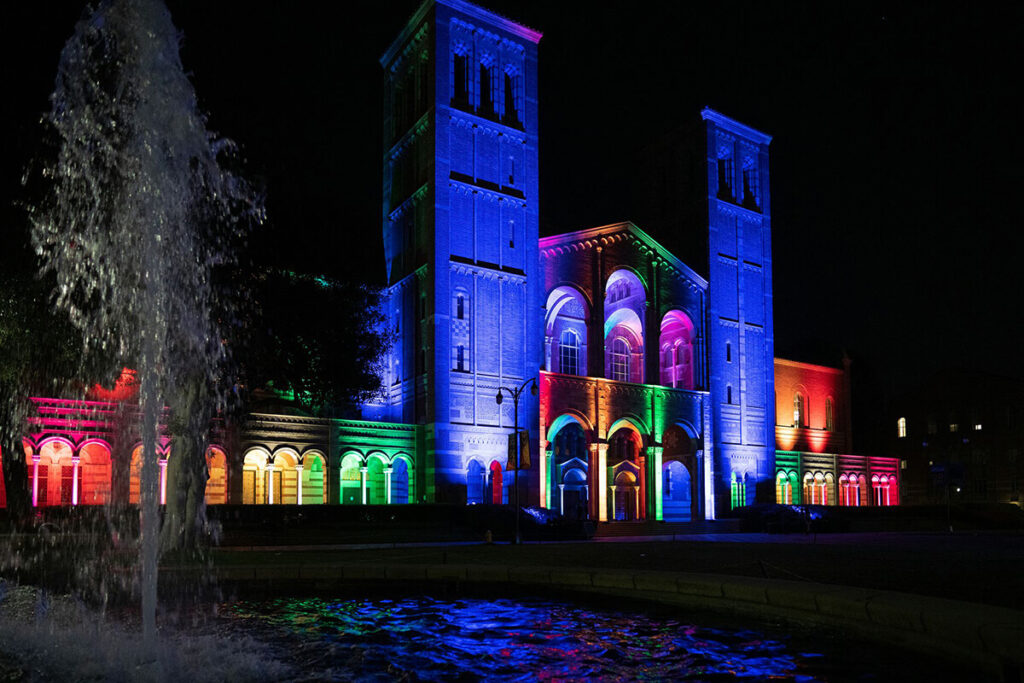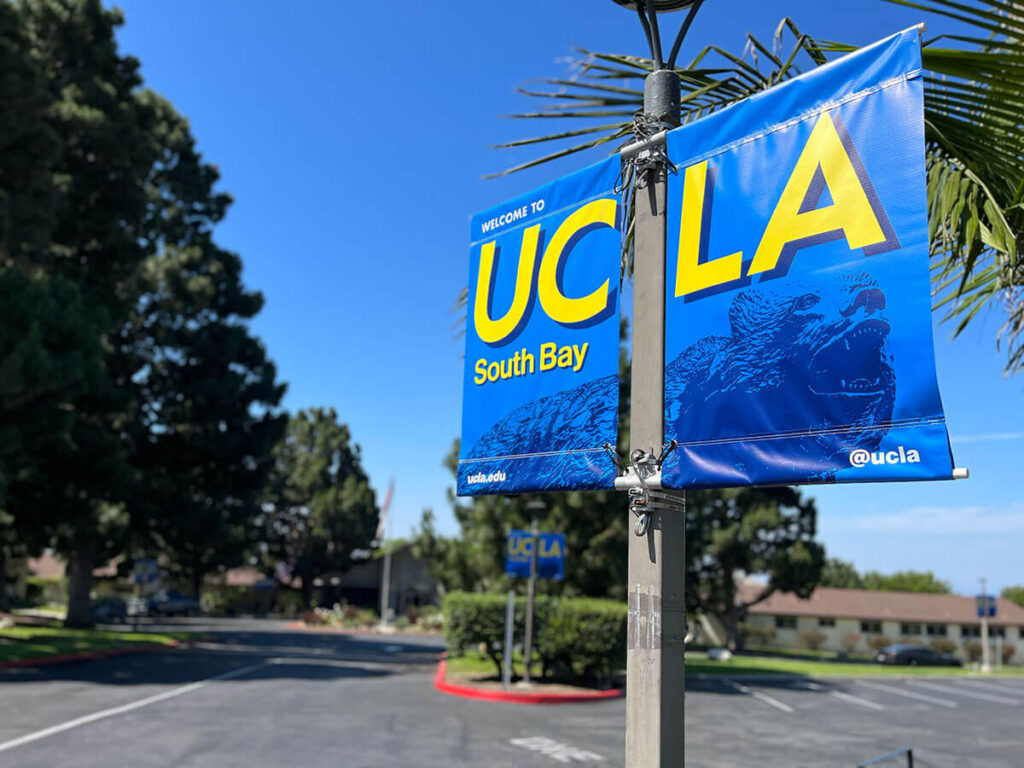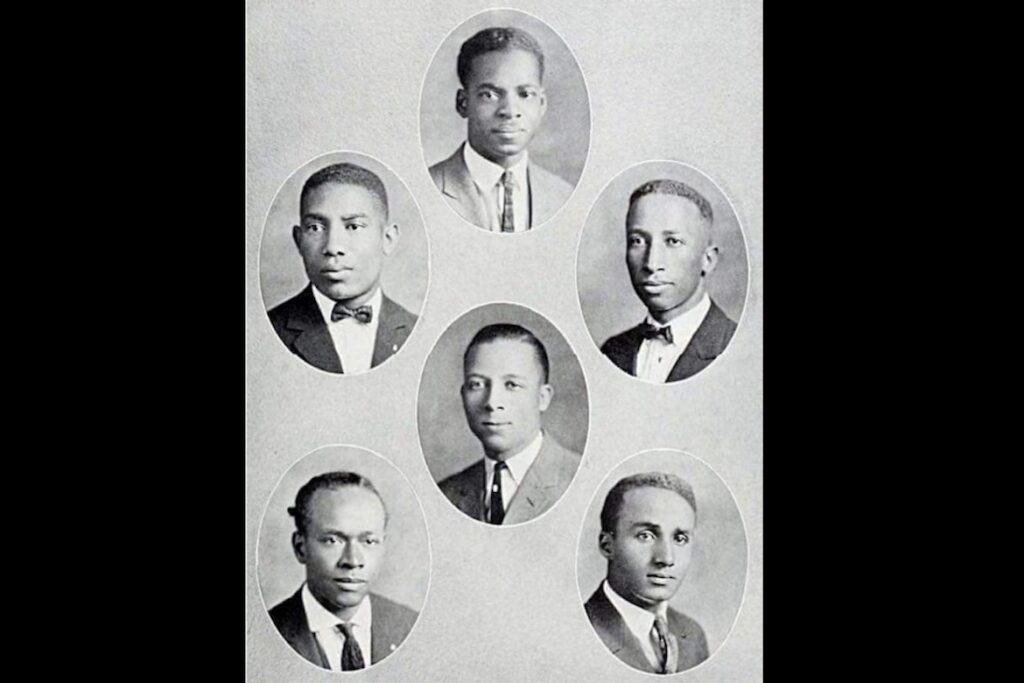
Photo by Eden Yu
My Summer 2023 Update speaks to the ways in which UCLA students, staff and faculty are putting into practice our True Bruin values of respect, excellence and service.
In this issue, I recognize UCLA School of Law’s Williams Institute, reflect on the recent passing of its visionary namesake and double alumnus Chuck Williams, and celebrate its critical work to advance LGBTQ+ rights through research.
I also offer a look at a student leadership academy taking place this summer at the new UCLA South Bay campus and commemorate 100 years of Black Greek life on campus.
In this issue
- Advancing LGBTQ+ Rights Through Research
- Student Leadership Academy to Launch at New UCLA South Bay Campus in August
- A Century of Black Greek Life
Advancing LGBTQ+ Rights Through Research

A rise in anti-LGBTQ+ legislation and recent Supreme Court rulings have increased concerns about equal access and safety for the LGBTQ+ community. The current moment serves as an important reminder of the persistent challenges faced by LGBTQ+ people — and highlights the urgent need for rigorous research and informed analysis on issues that impact them.
The Williams Institute, founded in 2001 by alum Chuck Williams and his partner Stu Walter, stands as a pillar in this ongoing struggle.
The renowned research institute is a cornerstone of the UCLA School of Law and has significantly contributed to the study of sexual orientation and gender identity law. The Institute also helps ensure that facts and data — not biases and stereotypes — inform public policy and judicial decision-making on issues of concern to the LGBTQ+ community. It has played an instrumental role in the historic fight for marriage equality, with Institute research cited in the landmark 2015 Supreme Court case of Obergefell v. Hodges. Just last month, its research was cited by Supreme Court Associate Justice Sonia Sotomayor in her dissenting opinion in 303 Creative v. Elenis, in which the majority of the Court held that a business owner in Colorado could refuse to provide services to same-sex couples. Institute scholars have also presented testimony before Congress to inform a range of bills that impact LGBTQ+ rights, including the Equality Act and the repeal of the Don’t Ask, Don’t Tell military service policy.
This past spring, our campus mourned the passing of Chuck Williams. I knew Chuck well; he was a remarkably kind person who was deeply dedicated to the pursuit of justice and equality. I am grateful that his commitment to LGBTQ+ rights will continue to reverberate through the Institute. Brad Sears — the Institute’s founding executive director — and a team of passionate students, faculty, and staff will continue to carry forward Chuck’s life’s work.
The Williams Institute exemplifies UCLA’s mission of service and applied research by contributing data to shape policies that foster inclusivity, respect and fairness for all individuals, as well as by conducting rigorous, independent research on sexual orientation and gender identity. The Institute highlights the crucial role of research and education in the ongoing struggle for LGBTQ+ rights.
Student Leadership Academy to Launch at New UCLA South Bay Campus in August

Building future leaders and serving the Los Angeles region are among the highest institutional priorities for UCLA. Next month we will launch a pilot program that will advance both of these goals when the first Student Leadership Academy takes place at our recently acquired UCLA South Bay properties. While long-term plans for use of the new properties are still being developed by UCLA administrators and faculty members, I am grateful that we are able to begin using the spaces to serve our educational aims this summer.
Over two separate three-day sessions in August, approximately 100 students selected from across UCLA will gather at UCLA South Bay to study leadership in all its facets. Students were nominated by educators across campus for the inaugural program.
Developed largely by UCLA Student Affairs, the Student Leadership Academy will be an immersive experience. Bruins will explore their own leadership strengths, consider solutions for major societal problems and engage with successful alumni and influential leaders in education, business, government, public health, technology and civic life. I am thankful to have been invited to participate in the first session myself!
One particular focus of the program will be on how to maintain healthy dialogue even when we disagree with someone. This is a critical goal of a UCLA education, as well as an essential leadership skill. The sessions will invite students to reflect on their own values and viewpoints, consider opposing ones, and learn how to respectfully debate points of contention without attacking another person’s humanity.
The aim of this and other UCLA leadership development programs — like our Leadership, Innovation, Networking and Knowledge program — goes far beyond career readiness. These initiatives build skills that can serve us in every aspect of life — in our communities, relationships, service activities and more.
It is gratifying to see our students’ growth as leaders and UCLA’s growth as an anchor institution within Los Angeles intersect through this summer’s Student Leadership Academy.
A Century of Black Greek Life

Greek life at UCLA was begun by Black Bruins. In January of 1923, the Delta Sigma Theta sorority, which had its birth at Howard University a decade earlier, established its Pi Chapter at UCLA. In April of 1923, the Upsilon Chapter of Kappa Alpha Psi fraternity was formed here as well.
Both were Black-run student organizations, part of a national effort to lift up African American people and cultures on college campuses at a time when students from marginalized groups faced widespread discrimination. These two organizations went beyond the traditional social club model to provide academic support and development of their members’ leadership skills. Black fraternities and sororities also provided a haven for Black students who could not join other Greek life organizations and who were confronted with racism on college campuses and in society at large.
A full century after the founding of Delta Sigma Theta and Kappa Alpha Psi at UCLA, this year their current members, alumni and partners across Los Angeles came together to celebrate the history and contributions of the two Greek organizations. Students and alumni held events to commemorate a century of community service, social activism and academic achievement — taking part in several days of festivities that included galas, volunteer activities and an exclusive screening of “Birthing Justice,” a documentary directed and co-written by triple Bruin and Pi Chapter alumna Monique Matthews.
The achievements of the two organizations over the past 100 years are remarkable. Pi Chapter members have tutored and mentored students throughout Los Angeles, organized food drives, engaged young Black women in professional development opportunities, and helped to lead efforts on behalf of women’s rights and other causes. Alumni have excelled, too: Miriam Matthews, one of the chapter’s founders and its first president, went on to become a civil rights activist, historian and Los Angeles’ first Black librarian.
The Upsilon Chapter has had a similar record of community service and has helped develop some of the nation’s most respected leaders in government, business, sports, the arts and the law. Its alumni include Los Angeles Mayor Tom Bradley, tennis icon and civil rights activist Arthur Ashe and Olympic medalist and chemist Jimmy LuValle.
We should all be proud of the fact that UCLA has two of the nine historically Black Greek-lettered organizations — collectively known as the Divine Nine — and that they were established during the very first year of fraternity and sorority life on UCLA’s campus.
In recognition of the impact that the Delta Sigma Theta sorority and Kappa Alpha Psi fraternity have had on Black life at UCLA and the world, the university is honoring both organizations this year with permanent plaques on campus, which will be mounted and ready for viewing by the beginning of the opening of the fall quarter. The crests of all Divine Nine chapters were recently unveiled at the Black Bruin Resource Center.
